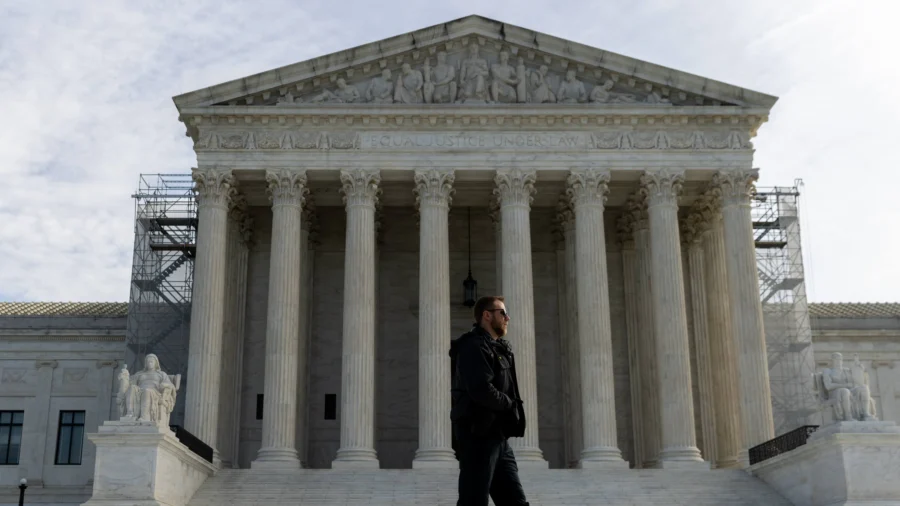The Supreme Court has refused to take up an appeal of a group of House Republicans regarding the pay that was docked because they did not follow the COVID-19 mask mandate in the House of Representatives between 2021 and 2o22.
The lawsuit—filed by Reps. Ralph Norman (R-S.C.), Marjorie Taylor Greene (R-Ga.), and Thomas Massie (R-Ky.)—was rejected by the lower courts.
Ms. Greene reportedly incurred more than $100,000 in fines for violating the rule that masks had to be worn on the House floor due to the COVID pandemic. That amount was deducted from her $174,000 salary.
Each violation resulted in $500 being deducted from their congressional pay. The lawmakers maintain that the pay deductions violate the 27th Amendment, which prohibits congressional salary adjustments from going into effect until after “an intervening election.”
In response to the Supreme Court’s move, Mr. Massie told The Epoch Times that the issue is more than just the mask mandate.
“By allowing Congress to be shielded by the speech or debate clause, even for actions explicitly prohibited by the Constitution, the courts have rendered the 27th Amendment unenforceable,” he said.
“There are other implications of accepting that Congressional behavior, even in contravention of the Constitution, is beyond the reach of the courts,” continued Mr. Massie. “For instance, do Congressmen have any obligation to allow constituents to engage with their social media accounts, or is the 1st amendment also not justiciable in this context?”
Ms. Greene nor Mr. Norman’s office responded to a request for comment.
Counsel for Speaker Mike Johnson (R-La.) asked the Supreme Court to let the lower court ruling stand.
“The rule was controversial, and all Members of the current House Leadership voted against it,” they wrote to the Supreme Court. “But this case is not about the wisdom of the rule or whether it was based on sound science. Rather, it is about whether Petitioners’ claims are subject to judicial review.”
However, the petitioners’ attorneys wrote, “To let the DC Circuit’s opinion stand would be to render the Twenty-Seventh Amendment non-justiciable in violation of this Court and the DC Circuit’s own precedents and to open the floodgates to unfathomable discipline.”
They continued, “The House Rules, under this Doctrine, could impose physical punishment, flogging, or even more medieval forms of punishment, upon members and, under the DC Circuit’s precedent, no judicial remedy would be available, the Eighth Amendment notwithstanding.”
In March 2022, a district judge dismissed the lawsuit, and the circuit court upheld it in June 2023.
“The Representatives sued the Speaker of the House, the Sergeant-at-Arms, and the Chief Administrative Officer, claiming the adoption and enforcement of the Resolution violated the First Amendment, the Twenty-Seventh Amendment, the Discipline Clause, the Compensation clause, and the Presentment Clause,” wrote the appeals court.
“The district court held the suit barred by the Speech or Debate Clause and dismissed for lack of subject matter jurisdiction.”
Overseeing the case in the appeals court were Judges Neomi Rao, a Trump appointee; J. Michelle Childs, a Biden appointee; and David Tatel, a Clinton appointee.
“The Representatives challenge the adoption and enforcement of the Resolution, which required wearing a mask in the Hall of the House,” the judges wrote.
“We cannot consider the merits of the Representatives’ constitutional arguments because their suit concerns legislative acts protected by the Speech or Debate Clause.”
That clause gives immunity from lawsuits that “extends to all legislative acts, including matters within the constitutional jurisdiction of the House,” the judges ruled.
“The House adopted the Resolution pursuant to its authority to ‘determine the Rules of its Proceedings,’ and it fined the Representatives pursuant to its authority to ‘punish its members for disorderly Behavior,’” the judges said, later adding that the resolution “and its enforcement are squarely within the jurisdiction of the House, and therefore legislative acts.”
Arguing for the representatives, among other attorneys, was Christopher Wiest, who wrote in the petition to the Supreme Court, “The refusal to wear a mask did not result in a disruption of congressional business.”
He argued, “Speech or Debate Immunity does not shield Congress in a way that renders pay claims non-justiciable.”
“A censure, a reprimand, the release of a House journal that condemned the Petitioners, or even, with 2/3 vote, a measure expelling the Petitioners, would be actions well within the ambit of Speech or Debate immunity,” Mr. Wiest wrote. “But here we deal with a pay claim.”
Mr. Wiest argued that the 27th Amendment clearly states, “No Law varying the compensation for the services of the Senators and Representatives shall take effect until an election of Representatives shall have intervened.”
“A primary purpose of the Twenty-Seventh Amendment is to prevent the reduction of congressional salaries without an intervening election because the Founders expressly recognized the majority could misuse its power to threaten the integrity and independence of Members, thus dissuading individuals of modest means from serving in Congress,” he argued.
Though the amendment is often mistakenly considered as a restriction solely on Congress’ power to increase its pay, that was only one of the purposes, he said.
From The Epoch Times


